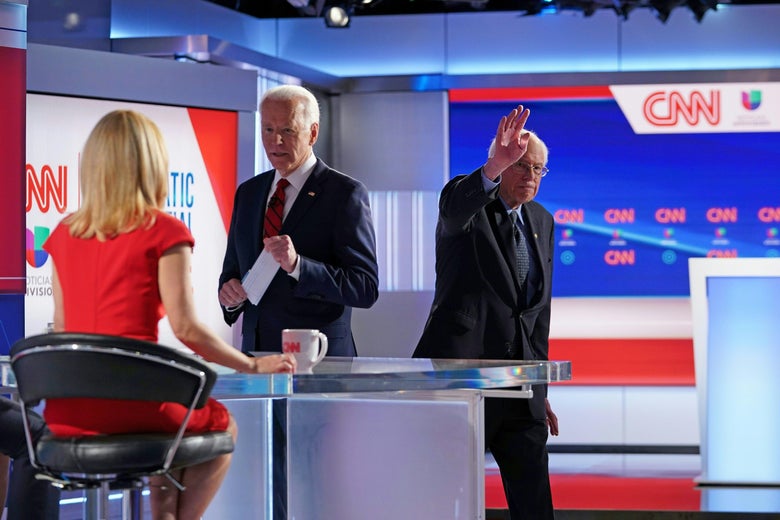
Joe Biden speaks to CNN news anchor Dana Bash as Senator Bernie Sanders leaves the stage after both men took part in the 11th Democratic Party 2020 presidential debate in a CNN Washington Bureau studio in Washington, DC on March 15, 2020.
MANDEL NGAN/Getty Images
Ho hum: Another primary night, another dominating delegate haul for Joe Biden. And this one should about do it.
Florida, with a closed primary featuring a more moderate and older electorate, was one of Sanders’ worst states heading into the night. Sure enough, he lost it by about 40 percentage points, not even coming close to winning a single county. Edison Media Research, which usually conducts in-person exit polls, instead phoned a random sample of early voters to survey the electorate. They results showed that Biden won about two-third of men and women, two-thirds of white voters, three-quarters of black voters, and even fought Sanders to an essential draw among self-described “very liberal” voters. The only demographic Sanders performed well with, as usual, was voters age 45 or younger, winning them by about 20 percentage points. Biden, meanwhile, won three-quarters of voters over 45, who made up 70 percent of the electorate. With 219 delegates at stake, Biden’s margin in the state will essentially wipe out all of the delegates Sanders has netted in states he’s won.
Illinois, offering 155 pledged delegates, was another romp across the board. Arizona, an overwhelmingly vote-by-mail state, has looked horrible for Sanders in recent polling, and even a miraculous comeback there wouldn’t affect the crushing delegate loss inflicted on Sanders in Florida and Illinois. Or just Florida. Or just Illinois.
As for the “coronavirus factor”—i.e., the wild fact that in spite of national guidance that no more than 10 people should congregate at any given time, presidential primaries, with lines and shit, were held—turnout in Florida was roughly in line with 2016 turnout, while turnout in Illinois was considerably down. That’s not to say that higher turnout, though, would’ve painted a different picture. If anything, we’ve seen this year that Biden has tended to thrive when turnout spikes, especially in suburban areas.
This might be the last major primary night we see for some time. The Georgia primary, with 105 pledged delegates on the line, was originally scheduled for next Tuesday but has been delayed until May. After that, a few, smaller-state primaries are scheduled in the coming weeks before Wisconsin is scheduled to vote on April 7. Then another three weeks elapse before major northeastern states like New York, Pennsylvania, and Connecticut are scheduled to vote on April 28. The key word, for each of these scheduled primaries, is “scheduled.”
Regardless, the race is effectively over. Joe Biden has built up an insurmountable delegate lead and, barring some major medical issue—we hear there’s a bug going around?— he will be the Democratic presidential nominee. It seemed hard to imagine that Democratic voters could speak with any clear voice just two and a half weeks ago, when there were still seven Democratic candidates jockeying for a percentage point or a delegate here and there. More than half of pledged delegates will have been allotted once Tuesday’s results are final, and Democratic voters couldn’t speak much more clearly.
This will apply more pressure on Sanders from mainstream party voices to DROP OUT and GO AWAY, so that the party can unite and focus on the general election and the goal of defeating Donald Trump. Sanders may well take them up on their hectoring and be out of the race by Wednesday morning.
But if he doesn’t, how much would it matter?
Consider the speech that Sanders delivered early on primary night, just as results were coming in. It was devoted strictly to his plans for combating coronavirus, which he laid out in detail on his website. He didn’t mention the primaries being held that night, didn’t mention Biden or his devilish votes from the 1980s, and didn’t address the future of his campaign. He just used his platform as a presidential candidate to express his principles for combating the epidemic, and mentioned specific items he might try to introduce as the Senate considers a trillion-dollar stimulus package.
In other words, he promoted his vision without doing any harm to the Democratic Party’s prospects for winning the presidency. There are few opportunities for him to do harm in the future, given that primary debates appear to be in the rear-view. Sanders doesn’t seem interested in trying to take Biden down anymore; in Sunday’s debate, it was more Biden, mysteriously, who was provoking Sanders. Besides, the primary itself is now, like everything else, a second-tier story to which fewer and fewer are paying attention while they’re fighting for their lives and livelihoods.
Sanders is in too big a hole from which to recover. But if he wants to stay in for a while longer to stream webcam videos from Vermont about the coronavirus, the Democratic Party will survive.
Readers like you make our work possible. Help us continue to provide the reporting, commentary and criticism you won’t find anywhere else.
Join Slate Plusfrom Slate Magazine https://ift.tt/2WoJj6e
via IFTTT
沒有留言:
張貼留言